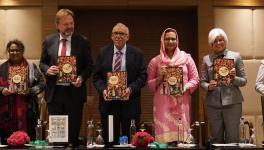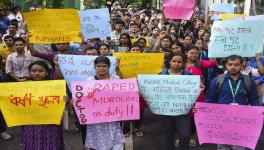Marital Rape: Finding the Right to Say No
Stressing on the violation of constitutional values and international law obligations that occurs due to Indian criminal law refusing to recognize marital rape as a legal offence, ABHINAV MEHROTRA and KONINA MANDAL recommend equipping One Stop Centres for women to support rape survivors and the adoption of a national policy to eradicate prejudices against married women.
AS the Supreme Court asks trial judges to not reveal the identity of victims of sexual offences cases, a question arises regarding who gets categorised as ‘survivors’ of sexual offences.
This question assumes more relevance during the ongoing pandemic when staying home has become the norm. It is advised to remain indoors to reduce the transmission of COVID-19, but the domestic space is not the safest place for those women with violent partners, who face a looming risk of exacerbated abuse during lockdowns.
The severity of the issue can be understood from the statement made by the United Nations (UN) Secretary-General flagging “a horrifying global surge in domestic violence” due to coronavirus lockdowns.
One of the most odious forms of such violence is in the form of rape.
Also read: Behind Closed Doors: Half the Conversation on Marital Rape
What is marital rape?
Marital rape can be defined in line with the legal definition of rape as ‘unwanted intercourse by a man on his wife, obtained by force or threat of force, or physical violence or when she is unable to give consent’. It is not a mere act of non-consensual sex, but execution of aggravated violence with sexual intercourse as the main weapon.
Seen in this light, it is pertinent to mention that The Declaration on Elimination of Violence against Women, 1993 (DEVW), which is part of customary international law, declares that nations should
“[W]iden the definition of rape in its Penal Code to reflect the realities of sexual abuse experienced by women and to remove the exception of marital rape from the definition of rape….”
Also read: Making Marital Rape a crime does not destroy the institution of marriage
The reason cited for this is that the aftermath of marital rape is as horrendous as the act itself. Victims of marital rape suffer long-term deleterious effects on their physical, psychological as well as financial health. Since these offenses are conducted by the member of the household, in most cases, the victims are unable to resort to psychological or financial support.
Unfortunately, India does not recognize marital rape as an offence. This is contrary to our constitutional guarantee of a life of basic minimum dignity, and our international law obligation under DEVW.
Moreover, when the Indian Penal Code does not create exceptions for married persons for offences such as voluntary causing hurt or culpable homicide, then why is a heinous offence like rape qualified by the relationship of the survivor with the perpetrator?
Also read: Only 36 Countries Have Not Criminalised Marital Rape, India Is One of Them
Judicial observations
Inspiration could be drawn in this context from Europe, where the judiciary has been proactive in dismantling such notions.
To illustrate, in its judgment in the case of R. vs. R [1991] UKHL 12 the U.K. House of Lords rejected that the immunity of marital intercourse had ever existed in England, and declared that it a “common law fiction which has become anachronistic and offensive”.
Also read: Supreme Court turns down plea seeking directions on registration of marital rape cases
Similarly, the European Court of Human Rights, in the case of C.R. vs. U.K. (A/355-C) opined that there exists a need to declare that a rapist remains a rapist under criminal law irrespective of the fact that he shares any kind of relationship with the victim, and that there is no difference between a wife and any other woman qua the offence.
In recent times, the Supreme Court of India has consistently held in various judgments that the law does provide extensive protections to women, including the right to refuse unwanted sexual advances by men. The question of marital rape was discussed by it in its landmark judgement in Independent Thought vs. Union of India & Anr. (AIR 2017 SC 4904), where the Supreme Court deliberated upon the issue of whether the sexual intercourse between a man and his wife who is between the age of fifteen and eighteen is rape or not.
Also read: Implications of reading down of the Marital Rape Exemption by the Supreme Court.
In the judgment, the apex court observed that the marital rape exception clause creates an unnecessary and artificial distinction between a married girl child and an unmarried girl child that has no clear nexus with the object sought to be achieved. The distinction violates the right to equal protection under Article 14 of the Constitution as well as the constitutional philosophy and ethos embodied under Article 15(3) and Article 21 of the Constitution that deal with special protection for women and children and the right to life and personal liberty, respectively.
It cannot be overemphasised that by not criminalising such conduct and providing marriage as a defence to rape allegations, the State effectively endorses the view that forced conjugal relations are acceptable. In this manner, it further perpetuates stereotypes and biases against married women, including the idea that consent is implied by marriage, and that women lose their bodily autonomy when they enter into a marriage.
The way forward
The union government created an elaborate and ambitious framework of rehabilitation centres called One Stop Centres (OSCs) in 2013-14 to support women affected by violence, regardless of whether the violence occurred in private and public spaces, within the family, community and at the workplaces. However, it has been pronounced as “a failed project”.
While some function as ‘marital dispute resolution centres’, they have largely failed to cater to survivors of rape in particular as the criminal justice system still lacks a clear vision for victim assistance.
Even today, women face significant barriers to access justice, legal aid, health care and counselling. The shortage of trained counsellors, well-functioning legal aid schemes and failure to integrate key players such as the police and hospitals have hindered the objectives of such OSCs.
Recently, the Ministry of Women and Child Development has proposed to set up 300 new OSCs in the country, in addition to nearly 700 existing ones, but there seems to be very little data on the functioning of the existing ones. Based on past information, implementation of the OSC scheme has left much to be desired.
The recent establishment of Sakhi in Madurai is a flicker of hope in this direction, but state governments, in conjunction with the union government must not only ensure the set up, but also proper functioning of such centres to primarily cater to the needs of rape survivors.
In the larger scheme of things, states also need to adopt a national policy towards eradicating pervasive stereotypes and stigma against women and married women in particular, similar to the guidelines that came after the Vishaka judgement that addressed the issue of sexual harassment at the workplace.
In this respect, guidance can be sought from the Basic Principles and Guidelines on the Right to a Remedy and Reparation for Victims of Gross Violations of International Human Rights Law and Serious Violations of International Humanitarian Law, proclaimed by the UN in 2005, that mandate that the victims of human rights abuses shall be provided full and effective reparations such as restitution, rehabilitation, and guarantee of non-repetition.
(Abhinav Mehrotra and Konina Mandal are both lecturers at Jindal Global Law School, O.P. Jindal Global University. The views expressed are personal.)
The article was originally published in The Leaflet.
Get the latest reports & analysis with people's perspective on Protests, movements & deep analytical videos, discussions of the current affairs in your Telegram app. Subscribe to NewsClick's Telegram channel & get Real-Time updates on stories, as they get published on our website.
























